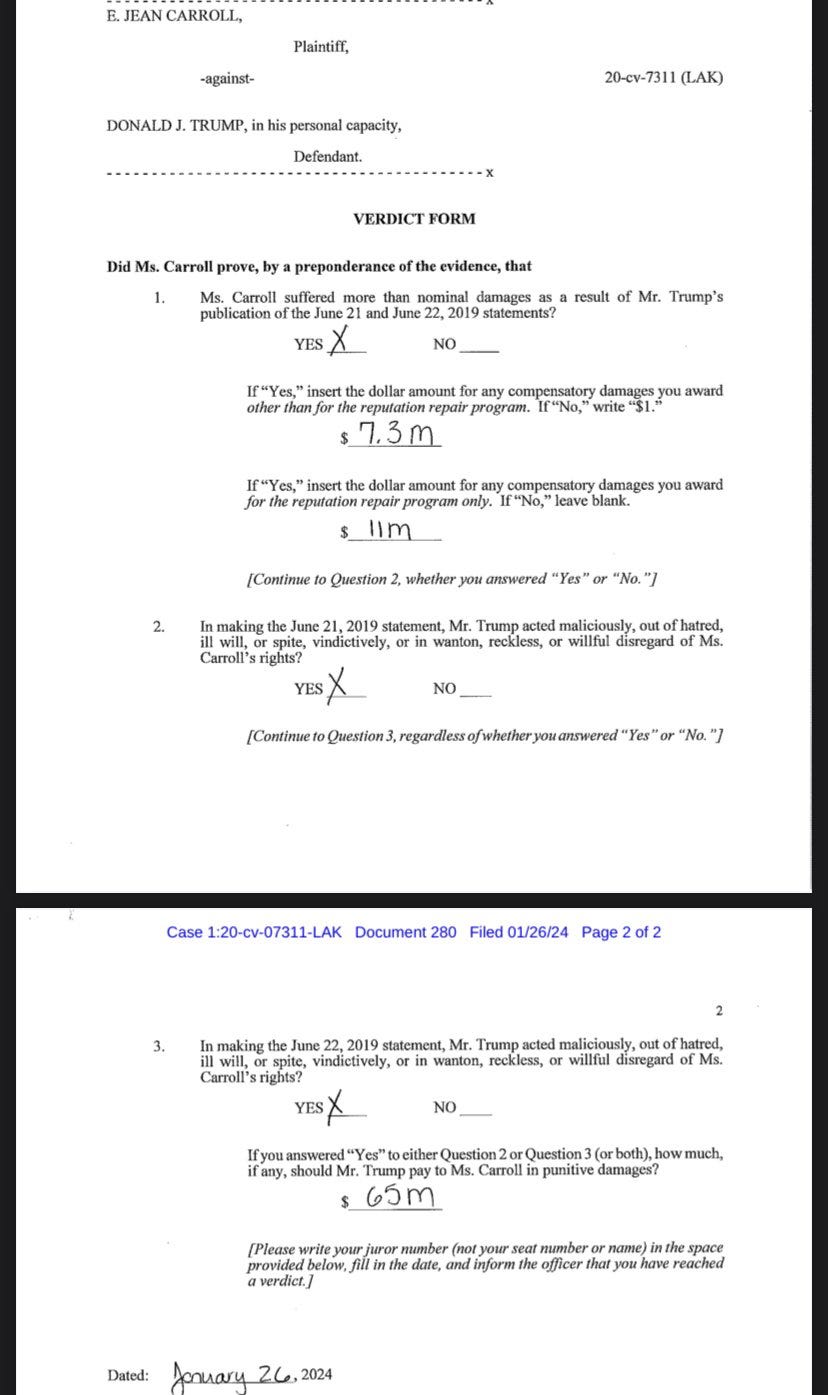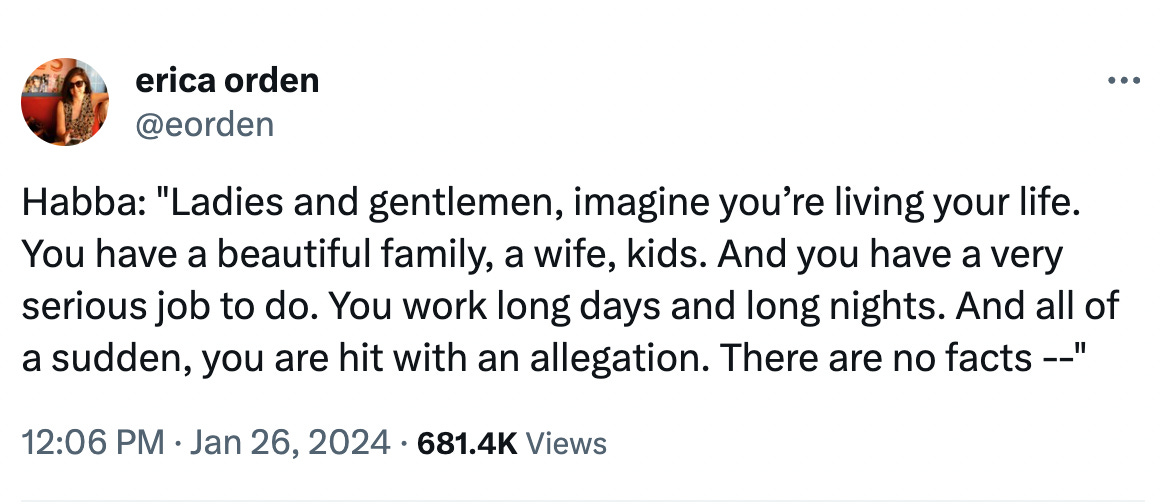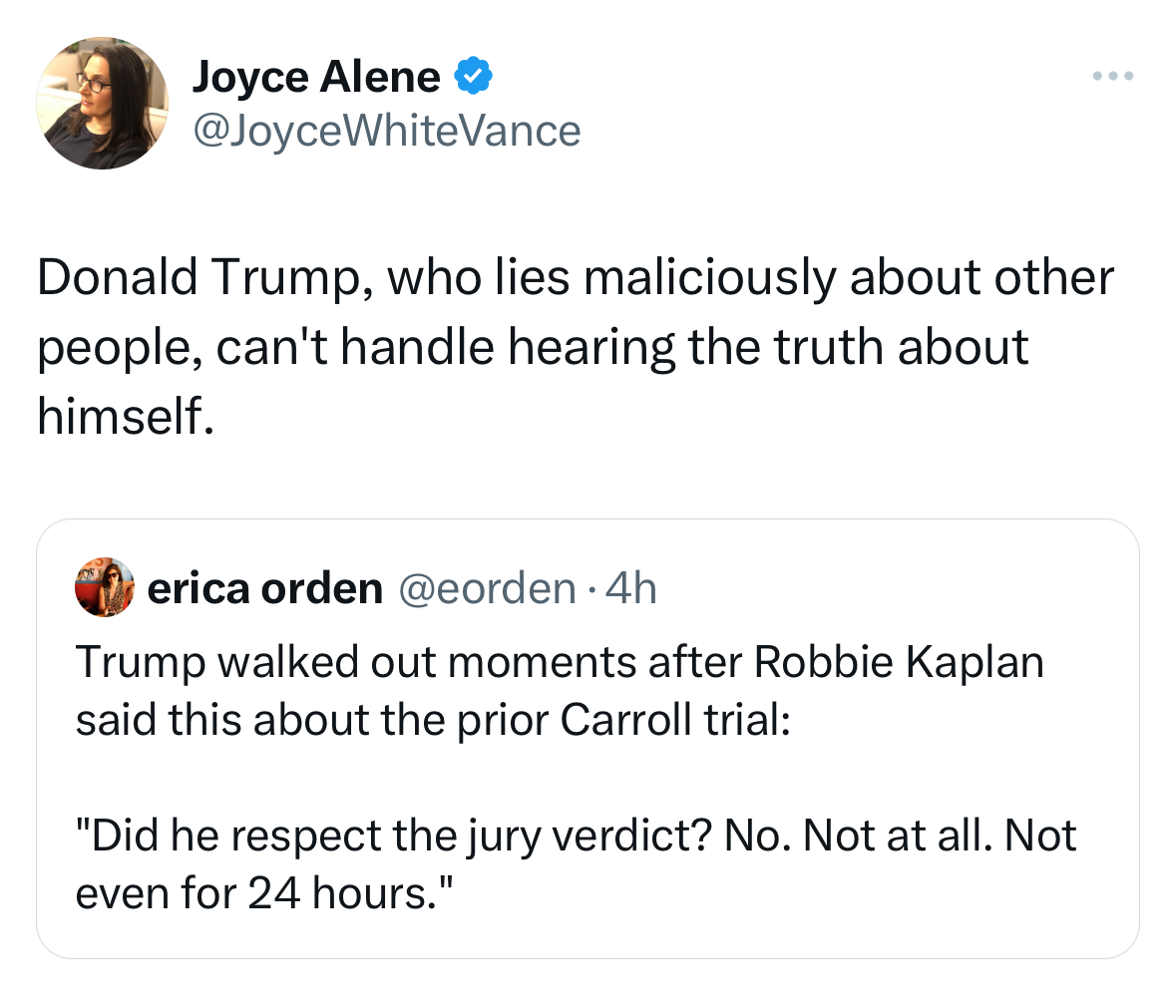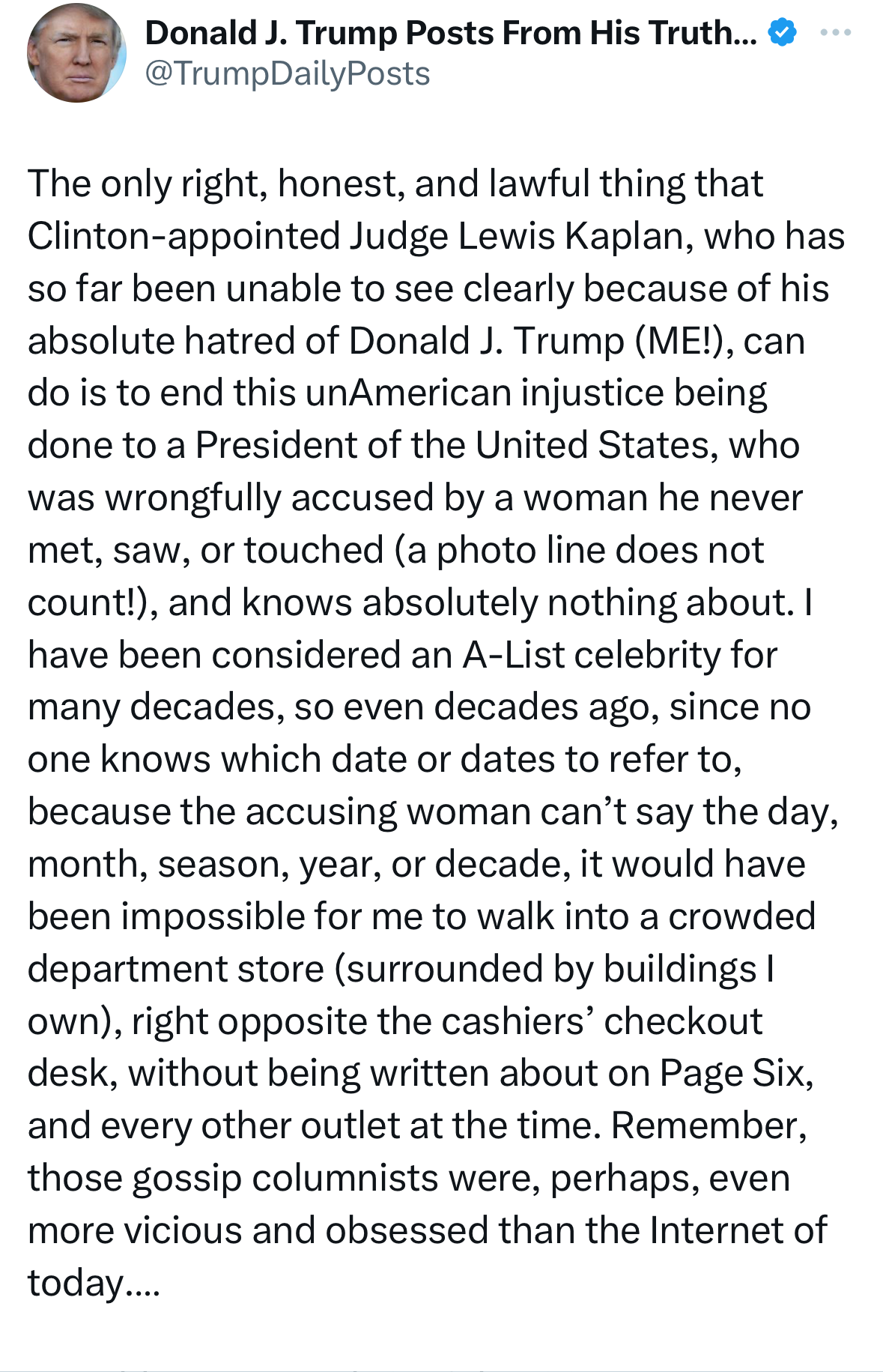$83.3 Million
I had not intended to write about the E Jean Carroll trial again tonight; I was going to give you a night off. But it’s impossible not to, with the jury reaching its decision after just a few hours of deliberation. Beyond the verdict, there were some interesting and highly significant developments today that merit our attention.
Damages
First off, the verdict by the numbers. The jury awarded E. Jean Carroll two items of compensatory damages: $7.3 million for pain and anguish and $11 million for reputation repair. After finding that the statements Trump made about Carroll on two separate occasions in June of 2019 were made with malice, they added on $65 million in punitive damages.
Of course, Trump went on the warpath pretty quickly. But two different juries have now found he acted with malice, which is the standard for awarding punitive damages. And now Trump must maintain that two entirely different juries were prejudiced against him, just like every prosecutor, every investigation, and every allegation of business misconduct is part of a witch hunt. It starts to wear thin, and now with the election on everyone’s front burner, it will be interesting to see whether moderate Republicans and Independents begin to peel off. How do you explain to your kids that you’re going to give your vote in the presidential race to a man who forced his fingers into a woman’s vagina and then lied about it and about her, and exposed her to public ridicule and harm?
Jury Instructions
Judge Kaplan had an unusual inclusion in his jury instructions, something I’ve never heard a judge do before. He read from the Constitution. He talked about “we the people” and the establishment of a justice system. And he referred to the history of the Southern District of New York, where federal courts have been in existence since 1789.
Donald Trump was arguing for “jury nullification,” that no matter what the judge instructed them, the jury should reject the finding in the earlier trial—that Trump had sexually assaulted Carroll and lied about it—and that they should refuse to grant her damages in a significant amount. So the Judge, in a low-key way that certainly doesn’t rise to the level of reversible error but is nonetheless out of the ordinary, reinforced the importance of the court system and its integrity in the minds of the jurors before they deliberated. That is a reasonable counterbalance to the chaos Trump tries to insert into judicial proceedings and was perhaps the final element of Judge Kaplan’s careful control of his courtroom, which prevented a dissent into theatrics and prevented the trial from becoming just another campaign venue.
Alina Habba
Alina Habba’s behavior at trial was disgraceful. I would not be surprised to see the Judge refer her to the Bar Association for disciplinary action. It wasn’t her novice mistakes that were the issue, although they caused a lot of comments. It was her flagrant disregard of the Judge’s decisions about arguments that could and could not be made to the jury. She trod on those rulings despite repeated warnings from the Judge.
If you think a judge has made an erroneous ruling at trial, you can take it up with the court of appeals. Alina Habba’s repeated strategy was to fight with the Judge. Tell her she couldn’t do something, and she jumped right in anyhow, repeatedly insinuating that Trump didn’t assault Carroll. The Judge would be well within his rights to let the Bar sort her out. Her lack of respect for the rule of law, which mirrors her client’s, is unacceptable in a lawyer.
It was only the Judge’s focus and immediate rulings before too many words came out of her mouth that prevented the jury from hearing inappropriate comments from her. Again, cases like this are best handled by a judge with many years of experience, one who has seen it all and is prepared to handle it. As Robbie Kaplan interrupted Habba’s comments, above, to object, the Judge told Habba to "Move onto a subject different than you are embarking upon."
Trump’s Temper Tantrum
Trump stormed out of the courtroom in the middle of closing argument by Carroll’s lawyer.
Since the appellate court doesn’t see how people in the courtroom behave or know who walks in or out, Judge Kaplan made a complete record for them, interrupting Robbie Kaplan’s comments to say, "The record will reflect that Mr. Trump just rose and walked out of the courtroom." He ordered Trump’s lawyers to remain seated.
This doesn’t happen. Parties don’t throw temper tantrums and stalk out of the courtroom while opposing counsel is speaking. One suspects this move may have sealed Trump’s fate with the jury. But it’s also a cautionary tale for judges in his future cases, who will now need to advise him that he may not do this in their cases and that they would treat this type of disruption very seriously. Judge Kaplan was successful in keeping this trial on track because he repeatedly told the lawyers and the parties what they could and could not do. Now, this gets added to the list for future cases.
Trump has only himself to blame for the award of punitive damages
In closing, Kaplan referred to the posts and comments about Carroll that Trump continued to make during the trial, noting that Trump made his "most reprehensible statement of all last Thursday." Trump tore into Carroll after saying these words: "I’ll say it again, a thousand times."
Oops. This rang louder than Trump’s three minutes of testimony from the witness stand. The out-of-court statement was a confession that he would continue to defame Carroll. He left the jury with little choice other than to award damages, in an amount like $83.3 million, designed to get Trump’s attention. Absent this kind of behavior, damages might have looked more like they did in the first case, where Trump was ordered to pay Carroll $5 million.
It's this kind of promise by a defendant that can convince a jury to smack him with punitive damages.
Kaplan told the jurors that Trump’s comments meant he’d continue to harm Carroll "unless you make it stop." That message seems to have found its target.
Last but not least
We did not get to watch this trial, or even listen to it in progress, because it was in federal court where there are no cameras. Unless you were able to make it into one of the available seats in the federal courthouse in Manhattan, the best you could do was read along with reporters who were live tweeting or hope for a few notes from friends inside of the courtroom.
I’m grateful to all the people who made it possible for us to get a window in on the proceedings, but it shouldn’t have to be that way. A week ago, I wrote about a bill Congress passed to ensure remote access to court proceedings for family members and survivors of the victims of Pan Am Flight 103, which was bombed over Lockerbie, Scotland. If you missed that column, I hope you’ll take a look. And make sure your members of Congress hear your voice. We need a sustained campaign on this one, and don’t hesitate to write or call because your member(s) are Trump supporters. If that’s the case, reach out to all of your like-minded friends and make sure you flood your representatives’ office with calls and letters demanding that you, as an American citizen, have the opportunity to view the trial of the former president, regardless of where you live.
For the last week and a half, we’ve had the rare experience of watching a Judge and a jury impose accountability on Donald Trump for his words and deeds. It was reassuring. E. Jean Carroll will forever be a national hero, a treasure. Where Republican leaders have groveled at Trump’s feet, she has shown incredible bravery, and we are all better off for it.
Welcome to all of the new subscribers to Civil Discourse this week. I think this trial struck a chord among people who want to commit themselves to democracy and make sure we all stand up, like Carroll has, to protect our country in this election year. I’ve appreciated all of the emails you’ve sent me, and the comments to each newsletter from this week’s new subscribers! I’m so grateful that you’re all here. We have a Republic to save.
We’re in this together,
Joyce






My note to her in her Substack which she took the time to write to tonight. Do we feel loved and appreciated by her. You bet!
Anyway, here it is:
E. Jean,
I cannot express how proud I am to know you. Your unwavering strength and determination have left an indelible mark on my heart. As I reflect on your arduous journey, I am reminded of the story of David and Goliath. In my eyes, you are the fierce, battle-born woman who bravely faced your own Goliath and emerged victorious.
When my young nephews ask me about you, I will tell them a tale of courage and resilience. I will share with them the story of a woman who fearlessly stood up against injustice, even when the odds seemed insurmountable. I will tell them about your unwavering determination to seek justice and the impact it has had on countless lives.
You have become a symbol of strength and hope, not just for women, but for all. Your bravery has shown us that we have the power to slay our own giants, to overcome the challenges that life throws our way. You have taught us that no matter how daunting the battle may seem, we must never lose faith in our ability to make a difference.
E. Jean, you are an inspiration to us all. Your story will be passed down through generations, a testament to the power of resilience and the pursuit of justice. You have shown us that one person can make a difference, that one voice can spark change.
Thank you for being the embodiment of courage and for reminding us that we are capable of achieving greatness. I am honored to know you and proud to call you a role model. May your story continue to inspire others to stand tall and fight for what is right.
God bless Robbie and her team who are inspiring examples of the legal system.
God doubly bless Judge Kaplan for his exemplary grace under fire.
Gloria
I sincerely hope the Judge does refer Habba to the Bar Association. Her conduct is unbecoming how an officer of the court should behave.